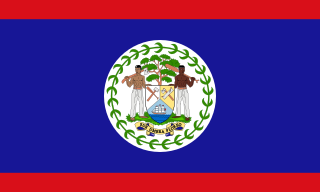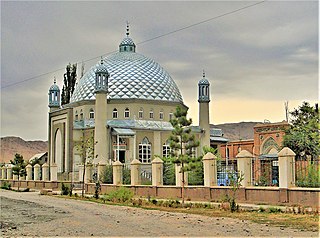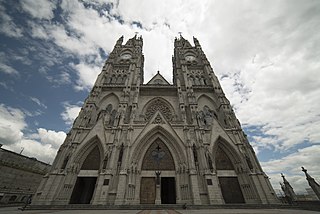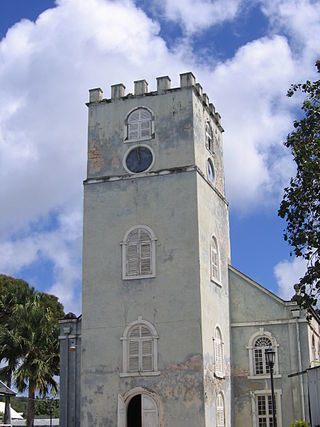Related Research Articles

The predominant religion in Brazil is Christianity, with Catholicism being its largest denomination.

Christianity is the largest religion in Seychelles, with Roman Catholicism being its largest denomination.

Christianity is the dominant religion in Belize. The single largest denomination is the Catholic Church with about 40.1% of the population, a reduction from 49.6% of the population in 2000, 57.7% in 1991 and 61.9% in 1980, although absolute numbers have still risen. Other major groups include Pentecostal with 8.4% of the population up from 7.4% in 2000 and 6.3% in 1991, Seventh-day Adventists with 5.4% of the population up from 5.2% in 2000 and 4.1% in 1991. The following of the Anglican Church has been steadily declining, with only 4.7% of the population in 2010 compared to 6.95% in 1991. About 12,000 Mennonites live mostly in the rural districts of Cayo and Orange Walk. People who declared they belong to no religion make up 15.5% of the population in 2010, more than double their 2000 census numbers. 11.2% adhere to other religions which include the Maya religion, Afro-Caribbean religions, Mormons, Hindus, Buddhists, Muslims, Baháʼís, Rastafarians and others.

Christianity is the largest religion in Uruguay, with Catholics having the most adherents, but around 44.5% of the population is non-religious as of 2021. Church and state are officially separated since 1916.

Religion in Angola is diverse, with Christianity being the most widely professed faith. Roman Catholics constitute 41% of the population. Other Christian denominations include Baptists, Methodists, Congregationalists, Lutherans, Reformed Churches and Seventh-day Adventists and Jehovah's Witnesses - all these denominations making up about 43% of the population.
The Constitution of Burundi provides for freedom of religion, and the Government generally respects this right in practice. Government policy contributes to the generally free practice of religion. In a 2007 US Government study, there were no reports of societal abuses or discrimination based on religious belief or practice.
The constitution of Cape Verde provides for freedom of religion, and the government has generally respected this right in practice. Government policy continued to contribute to the generally free practice of religion. There were no reports of societal abuses or discrimination based on religious belief or practice.

Islam is the main religion in Kyrgyzstan and the constitution guarantees freedom of religion.

When it comes to religion, the Ecuadorian society is relatively homogeneous, with Christianity being the primary religion. Catholicism is the main Christian denomination in the country. There are also minorities of other religions.

Religion in Guyana is dominated by various branches of Christianity, with significant minorities of the adherents of Hinduism and Islam.

Christianity is the most widely professed religion in Zimbabwe, with Protestantism being its largest denomination.

Christianity is the majority religion in Cameroon, with significant minorities of the adherents of Islam and traditional faiths.

The majority of the population of East Timor is Christian, and the Catholic Church is the dominant religious institution, although it is not formally the state religion. There are also small Protestant and Sunni Muslim communities.

Christianity is the largest religion in Nauru, with Nauru Congregational Church being the largest denomination, encompassing 35.71% of the population as of the 2011 census.

Christianity is the official and largest religion in Samoa, with its various denominations accounting for around 98% of the total population. The article 1 of the Constitution of Samoa states that "Samoa is a Christian nation founded of God the Father, the Son and the Holy Spirit".

Christianity is the predominant religion in Tuvalu, with Calvinism being the single largest denomination.

Religion in Barbados is predominantly Christian. Religious freedom is established by law and generally enforced in practice, although some minority religious groups have complaints about government practices that interfere with their beliefs.

Religion in Slovakia is predominantly Christianity, adhered to by about 68.8% of the population in 2021, a decrease from 75.5% in 2011 and 83.8% in 2001.

Mauritius is a religiously diverse nation, with Hinduism being the most widely professed faith. According to the 2011 census made by Statistics Mauritius, Hinduism is the major religion at 48.54%, followed by Christianity at 32.71%, followed by Islam 17.30% and Buddhism 0.18% in terms of number of adherents.
The status of religious freedom in North America varies from country to country. States can differ based on whether or not they guarantee equal treatment under law for followers of different religions, whether they establish a state religion, the extent to which religious organizations operating within the country are policed, and the extent to which religious law is used as a basis for the country's legal code.
References
- ↑ "Religions in Bahamas - PEW-GRF". www.globalreligiousfutures.org. Retrieved 8 April 2018.
- 1 2 3 United States Bureau of Democracy, Human Rights and Labor. Bahamas: International Religious Freedom Report 2008.
 This article incorporates text from this source, which is in the public domain .
This article incorporates text from this source, which is in the public domain . - 1 2 3 4 5 6 7 US State Dept, 2022 report on Bahamas